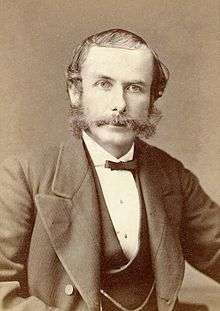John Francis Barnett
John Francis Barnett (16 October 1837 – 24 November 1916)[1] was an English music composer and teacher.

Life
John Francis Barnett was the son of John Barnett's brother, Joseph Alfred, also a professor of music. John Francis carried on the traditions of the family as a composer and teacher. He obtained a queen's scholarship at the Royal Academy of Music, studied under William Sterndale Bennett and developed into an accomplished pianist, visiting Germany to study in 1857 and playing Mendelssohn's Piano Concerto No. 2 in D minor at a Gewandhaus concert at Leipzig in 1860.[2] His teachers at the Conservatoire in Leipzig included the great pianist Ignaz Moscheles, who had been a pupil of Beethoven. Back in Britain, Barnett enjoyed a successful career as a pianist for some years but concentrated increasingly on composition and teaching. He became noticed as a composer with his symphony in A minor (1864), and followed this with a number of compositions for orchestra, strings and piano. His cantata The Ancient Mariner premiered at Birmingham in 1867, and another, Paradise and the Peri, in 1870, both successfully. In 1873 his most important work, the oratorio The Raising of Lazarus, was written, and in 1876 produced at Hereford. During this period, Barnett also composed several other minor cantatas and piano pieces, and he took an active part as a professor at the Guildhall School of Music and one of the founder-professors of the Royal College of Music,[2] where his students included Marmaduke Barton.
John Francis Barnett was twice married, his first wife having died in 1882 giving birth to their fourth child. Several later members of his family became successful musicians, namely his grandson John Francis Cook (1908-1992), who changed his name by deed poll to John Francis and became well known as a flautist and teacher; and his great-granddaughters Judith Fitton (flautist), Sarah Francis (oboist) and Hannah Francis (soprano).
Compositions (selective list)
Orchestral
- 1864 - Symphony in A minor (fp. Musical Society of London, 15 June 1864)
- 1868 - Overture symphonique in E (fp. Philharmonic Society, London, 11 May 1868), revised 1891 (Philharmonic Society, London, 28 May 1891)
- 1869 - Piano Concerto in D minor, Op.25
- 1873 - The Winter's Tale, overture (fp. British Orchestral Society, London, 6 February 1873)
- 1874 - The Lay of the Last Minstrel, suite in four movements (fp. Liverpool Festival, October 1874)
- 1881 - The Harvest Festival, symphonic poem (fp. Norwich Festival, 1881)
- 1883 - Two sketches: Ebbing Tide and Elfland (fp. Crystal Palace, London, 1883)
- 1888 - Pastoral Suite (fp. Philharmonic Society, London, 31 May 1888) [revised version of The Harvest Festival]
- 1895 - Two pieces: Liebeslied and Im alten Styl (fp. Crystal Palace, London, 1895)
- 1891 - Two sketches: Flowing Tide and Fairyland (fp. Crystal Palace, London, 1893)
- Concerto pastorale for flute and orchestra
Choral and vocal
- 1867 - The Ancient Mariner, cantata (fp. Birmingham Festival, 29 August 1867)
- 1870 - Paradise and the Peri, cantata (fp. Birmingham Festival, 30 August 1870)
- 1873 - The Raising of Lazarus, oratorio (fp. New Philharmonic Society, London, 18 June 1873)
- 1876 - The Good Shepherd, sacred cantata, Op.26 (fp. Brighton Festival, 1876)
- 1880 - The Building of the Ship, cantata, Op.35 (fp. Leeds Festival, 13 October 1880)
- 1880 - The Golden Gate, scena for contralto and orchestra (fp. Philharmonic Society, London, 4 March 1880)
- 1888 - The Triumph of Labour, ode for chorus and orchestra (fp. Crystal Palace, London, 1888)
- 1893 - The Wishing-Bell, cantata (fp. Norwich Festival, 9 October 1893)
- 1913 - The Eve of St Agnes, cantata (fp. London Choral Society, 1913)
References
- . Accessed 12 Nov 2014
-
